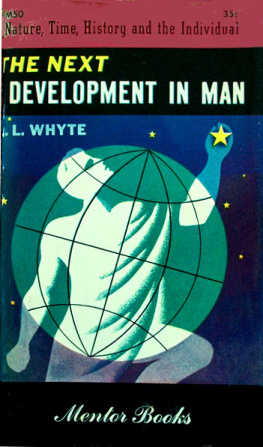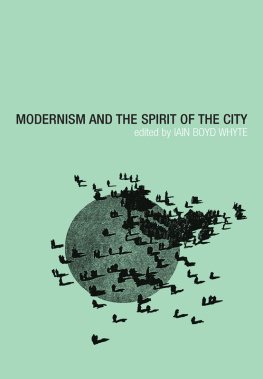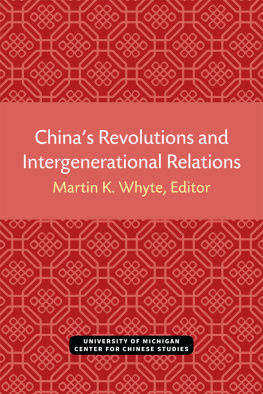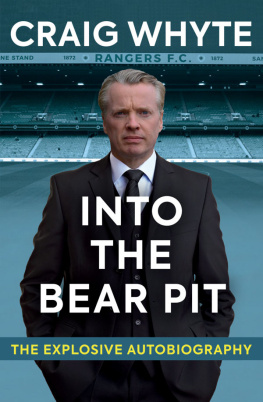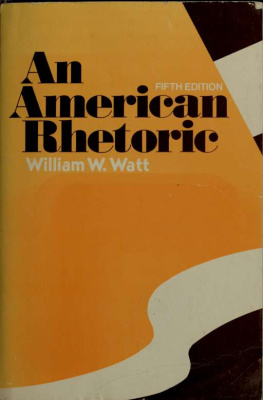THE NEXT DEVELOPMENT IN MAN by Lancelot Law Whyte THE Next Development in Man By the same author ARCHIMEDES, OR THE FUTURE OF PHYSICS (1927) CRITIQUE OF PHYSICS (1931) THE Next Development in Man LANCELOT LAW WHYTE NEW YORK: HENRY HOLT AND COMPANY Copyright 1948, by Lancelot Law Whyte Printed in the United States of America First Printing To the memory of LOTTE ACKNOWLEDGMENTMy thanks are due to E. P. Dutton & Co., Inc. for permission toquote on page 213 from the translation by John Veitch of Descartes'"Discourse on Method and Meditation on the First Philosophy" and on page228 from the translation by John Oxenford of Eckermann's "Conversationswith Goethe," both published in the United States in the Everyman Library. L. L. W. Preface to U. S. EditionIn the foreword written in May 1943 I undertook to make it known if Iever came to doubt the argument of this book or discovered errors inits development.I wish therefore to confirm that these years have strengthened myconviction that if civilization is not to decline during the comingdecades it can be only through the development of a universal methodof thought providing the basis for a unified humane science and for aworld society. A humane science is one which would show man the rightway to think in order to understand nature and life, including himself,and would thus further the development of a world community. Today onlysuch a science can speak with universal authority.I believe that what is needed is a 'language of process" supportedby the authority of science, and that the conception of process as thedevelopment of form outlined in Chapter 2, or similar ideas, will acquirethis sanction during the coming years by leading to a unification ofsciences of matter, life, and mind.In this book I have suggested that the deepest troubles of westerncivilization can be regarded as due to the fact that it had relied on alanguage of permanence, in which, following Plato, only the unchangingis real. For two centuries the West has been struggling to create avalid language of process -- witness Hegel, Marx, Bergson, and Whitehead,amongst others. But this task cannot be completed without the aid of exactscience, which has only recently begun to question the permanence of itsfundamental particles, and to search for an adequate concept of process.As physics was not ready to speak the authoritative word, I wrote thisbook as an exercise in a new language of process. It is thus an attemptto develop a method of thought based on a new concept of process,and at the same time to interpret the failure of the West as due toits lack of this method and its use of concepts of permanence whichled to spurious dualisms. My next work applies the same unintellectualmethod to outline a theory of organism, for it is in living processesthat the development of form is clearest. The results appear to me toestablish the scientific value of the method, though this view awaitsthe confirmation of specialists.Thus what was an unsupported intuition when in 1937 I began to thinkout the argument of this book has now in 1947 become for me a testedconviction. On this central issue I have therefore nothing to withdraw. Iremain vividly aware of the oversimplification of some historicalpassages, and of the inadequacy of my scholarship to so comprehensivea theme. I also regret that I was not able to include a discussion ofthe work of Bergson, Jung, and Whitehead, to whom I owe much. But theseblemishes have not prevented a response which shows that I am one ofmany who share the same general view.There is however one topic on which I would express myself differentlytoday. I think it is wrong to suggest that Russia has gone furthesttowards a unitary society, even if following a path appropriate onlyto her. World order implies a unity tolerant of diversity; truth,justice, and the welfare of man depend on individuals with the courageand opportunity to express their varied opinions. It was the freedomof the West which nourished Marx and Lenin, and so made possible thetransformation which created Soviet Russia. The fate of mankind in thecoming decades may be profoundly influenced by thinkers in the West usingtheir freedom to find means of overcoming the doctrinal conflicts whichhave so aggravated the ancient isolation of Russia from the West. Thiscan only be done by discovering a universal method of thought appropriateto the present stage in the development of man. I here make an attempt inthis direction; may there be many more, until a unitary science compelsattention of the race to a way of thinking which can unite mankind. L.L.W. London, July 1947.Contents Preface vii Foreword xiI Introduction 1II Development 25III The Characteristics of Man 47IV European Man 73V The European Tradition 100VI Europe after 1600 128VII The Twentieth Century 166VIII Nine Thinkers: Heraclitus, Plato, Paul, Kepler, Descartes 190IX Nine Thinkers (continued): Spinoza, Goethe, Marx, Freud 216X Unitary Man 246XI The World Trend 278 Postscript 306 Appendix: Glossary of Unitary Thought 312 Index 317ForewordTo be alive is to undergo ceaseless change. Man fears change andseeks to deny it by imposing on it a principle of permanence. That mayoffer the illusion of escape, but it cannot bring understanding. Tounderstand nature, and himself, man must accept change and identifythe universal form of process which underlies the variety of particularprocesses. Understanding means the recognition of the simple form commonto all change. Man does not know nature or himself until he has discoveredthis underlying unity.I have long been convinced that the clue to the unity of nature liesin a principle of development. Countless processes of the inorganicand organic worlds, of social history and the individual life, displaydevelopment of various kinds. But this conviction sprang less fromparticular examples than from a sense of the general form of process. Itseemed to me that change consisted in the development of form. Before Ihad any direct contact with the thought of Heraclitus, Goethe, Hegel, orMarx I had begun to develop this sense of the form of process by applyingit unconsciously in daily life. Thus I gradually formed a unitary outlook,seeking the unity beneath diversity in a universal form of process. Thisattitude developed with the slow continuity of a plant growth.Then, as the outlook began to acquire definite shape, I found to mydelight that others had already followed a similar path, and I hopedthat the assurance so gained would bear fruit in the application of themethod to special scientific problems. But I was not able to convertthe intuitive conviction into a scientific method suited to the physicalproblems with which I was then concerned. There seemed to be no adequatebridge between the vague conception of a universal process of developmentand the system of exact science, so powerfully justified by its uniqueachievements. It appeared that an adequate basis for the unitary methodcould only be established by undertaking the most comprehensive taskof all: the development of the general system of thought appropriateto contemporary man, which can extend his understanding of nature andtherefore of himself. But this seemed to demand leisure and capacitieswhich were not available.Yet as the years passed I realized that for good or ill I had my owncriterion of truth. I might distrust all else, but not this sense whoseorigins seemed to lie outside me. I could not deny the sense that inmy thought a general truth was finding expression. Time and scholarshipwere less necessary if all I had to do was to trust this criterion andallow it to use me as its editor and scribe.As I watched the world drifting towards renewed disaster my scepticismlost its force. Events seemed to be catching up on me; the general needfor a reorganization of life and thought would soon be widely recognized;I had no reason to hesitate if the world was in so grave a plight. Myconviction grew deeper and rooted itself in a developing interpretation ofscience and of history. The method which I was maturing was in accordancewith the historical trend. The first task was to use the method to showwhy it is now appropriate. A unitary interpretation of the process thathas brought man to his present situation must precede the developmentof a unitary science.Man's chief asset is his ability to discover a form of truth onwhich others may build. If what follows cannot contribute toscience, let it perish unremembered. Yet the expression of apositive view must be dogmatic. The structure of language itselfinvolves dogmatism, more dangerous because concealed. Here Imake one explicit assertion, and show that it leads, not of logicalnecessity but by its own proper development, to an interpretationof the present disorganization of man and of his thought. If atany time I come to doubt the assertion, or discover errors in itsdevelopment, I undertake to make this known. L.L.W.London. May, 1943xiiiCRATYLUS: However, I assure you, Socrates, that I have already considered the matter, and after toilsome consideration I think the doctrine of Heraclitus is much more likely to be true.SOCRATES: Some other time, then, my friend, you will teach me, when you come back. I
Next page
